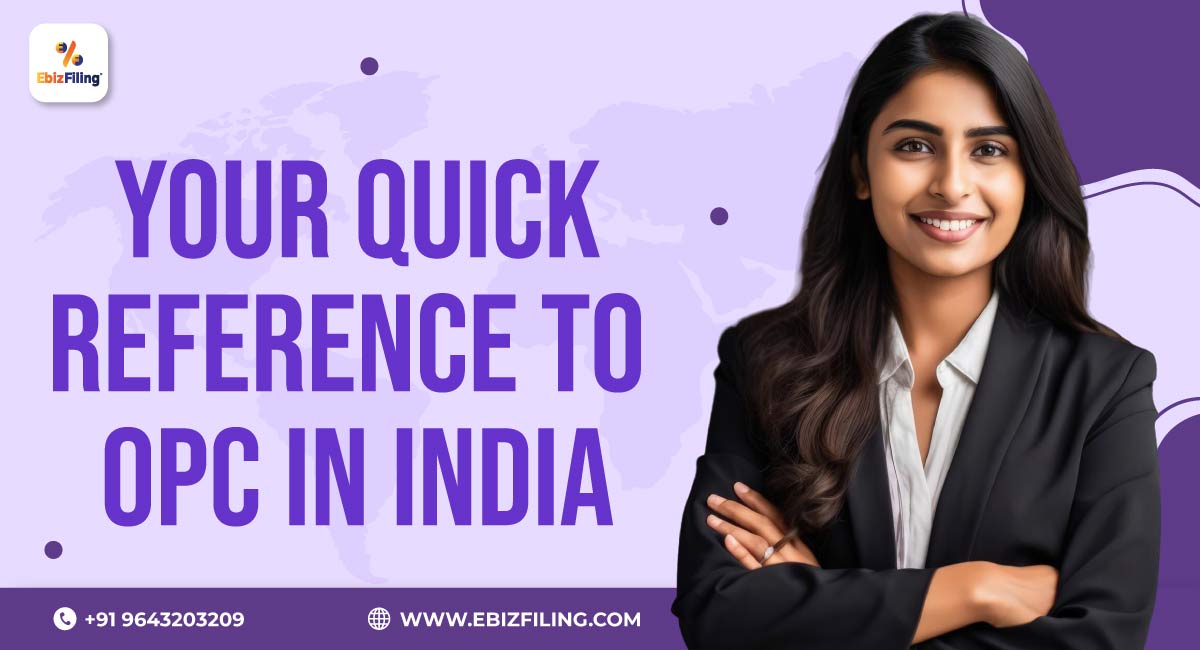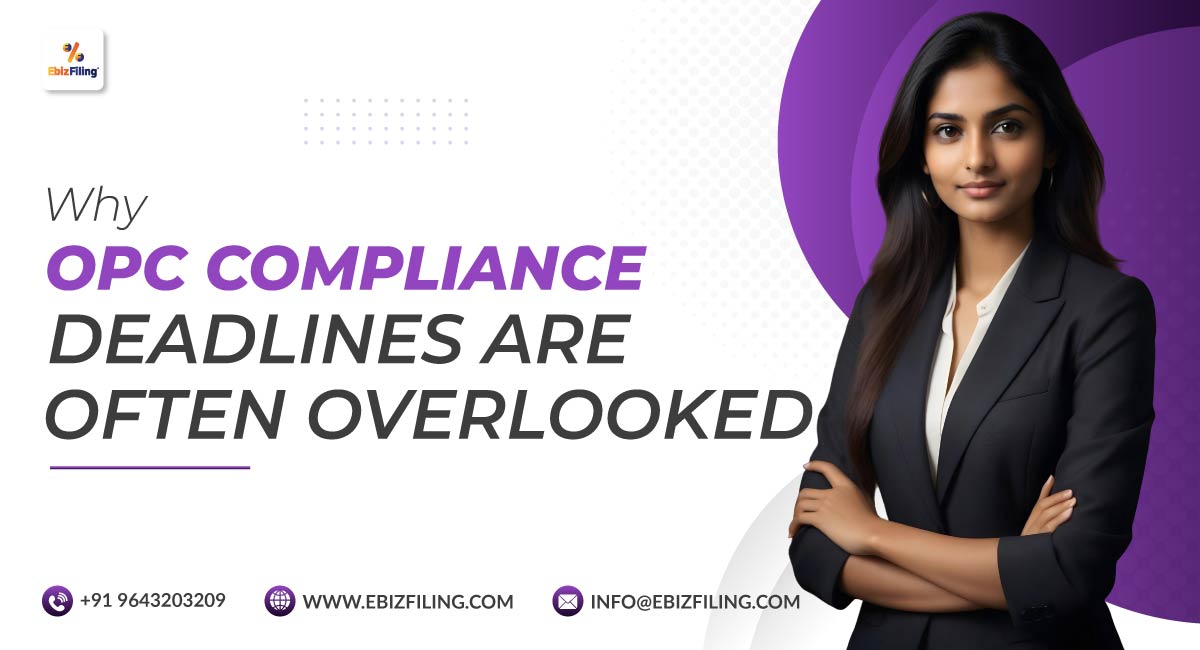What is an OPC and Why Are Exemptions Important?
An OPC (One Person Company) is a private company with a single shareholder and a single director. It allows individuals to run a company with limited liability and a separate legal identity without needing partners.
Exemptions and benefits help OPCs:
- Avoid frequent filings and procedural complexities
- Save time, cost, and administrative effort
- Focus more on business rather than legal formalities
What Are the Exemptions and Benefits Available to OPCs?
The Indian government offers several exemptions and benefits to One Person Companies to reduce compliance burden and encourage legal business operations. These help founders focus on growth rather than paperwork.
Here are the key exemptions and benefits that OPCs enjoy:
1. No Annual General Meeting (AGM) Requirement
- OPCs are exempt from holding AGMs under Section 96(1) of the Companies Act.
- The single member can approve resolutions via minutes-book entries.
- This removes the need for formal meeting notices and documentation.
2. Relaxed Board Meeting Requirements
- OPCs need only one board meeting in each half-year, not quarterly.
- A minimum 90-day gap is required between the two meetings.
- This reduces administrative burden compared to private companies.
3. No Cash Flow Statement in Financial Reports
- OPCs do not have to file a cash flow statement under Schedule III.
- This simplifies annual financial reporting and accounting.
- It reduces costs and complexity in preparing reports.
4. Company Secretary (CS) Not Mandatory
- OPCs with paid-up capital up to ₹2 crore don’t need a CS.
- The director can sign necessary documents and return forms.
- This saves cost on hiring or appointment of a CS.
5. Independent Directors Not Required
- OPCs are exempt from appointing independent directors.
- This avoids governance formalities and extra board requirements.
- The sole director retains full decision-making control.
6. Exemption from Auditor Rotation Rules
- OPCs are not subject to auditor rotation under Section 139(2).
- They can continue with the same auditor beyond standard tenure limits.
- This provides consistency and flexibility in audits.
7. No Internal Financial Controls Reporting
- OPC auditors are not required to report on internal control adequacy.
- Such reporting is applicable only to larger companies.
- This saves OPCs from detailed audit checklist requirements.
8. Director Alone Can Sign Annual Return
- If there’s no CS, the director alone can sign Form MGT‑7A under Section 92.
- This streamlines the filing process by avoiding coordination.
- Fewer formalities speed up annual compliance tasks.
9. Extended Time for Filing Financial Statements
- OPCs get 180 days from March 31 to file Form AOC‑4 (typically by September 27).
- This is longer than the 30-day AGM-linked deadline for other companies.
- It offers more time to audit financial statements carefully.
10. Low Compliance and Operational Costs
- With fewer meetings and filings, OPC compliance is cost-efficient.
- Lower fees, fewer professionals required, and less documentation help reduce expenses.
- It is an ideal structure for solo founders and small businesses.
How These Exemptions Apply in Real Life?
Consider a small online retail seller based in Ahmedabad, Gujarat.
She operates solo and registered her firm as an OPC to protect personal assets.
Thanks to OPC exemptions:
- No need to hold AGMs or appoint a CS
- Just two board meetings a year, with a 90-day gap
- She can sign and file the annual return herself
- AOC‑4 filed by September 27 without stress
These relaxations help her stay compliant, save costs, and focus on growing the business.
Compliance Exemptions vs Benefits for OPC
| Compliance Area | Exemption for OPC | Benefit |
| AGM | Not required under Section 96 | Less administrative work |
| Board Meetings | Only 2 per year (≥ 90‑day gap) | Simplified planning and documentation |
| Cash Flow Statement | Not required | Easier preparation of financials |
| Company Secretary | Not required if capital ≤ ₹2 crore | Saves on professional fees |
| Independent Directors | Not required | No need for governance compliance |
| Auditor Rotation | Exempt from rotation rules | Audit consistency and flexibility |
| Internal Controls Reporting | Not required | Streamlined audit process |
| Signing Annual Return | Director can sign without CS | Faster form submission |
| AOC-4 Filing Deadline | 180 days from FY-end | Extended time for accurate financials |
| Compliance Costs | Lower due to relaxed rules | Cost-effective structure for solo founders |
Who Should Consider an OPC Structure?
The OPC model suits:
- Solo Entrepreneurs wanting a corporate identity and asset protection.
- Freelancers and Startups seeking legal structure with minimal compliance.
- Proprietors moving from a sole proprietorship to a scalable, formal entity.
It offers a practical way to structure and grow a one-person business without legal burden.
Conclusion
The exemptions and benefits available to OPC from mandatory compliance make it an efficient structure for individual founders. With fewer meetings, simplified audits, and extended deadlines, OPCs can concentrate on business rather than bureaucracy. For solo entrepreneurs seeking growth with ease, OPC is the ideal choice.
Suggested Read :
Benefits of One Person Company
OPC Turnover Limit for Small Businesses
















OPC shall file AOC 4 form within 180 days from the closure of financial year.
However, this year, we have got time upto 31st December.
If Auditor does not generate UDIN within the 180 days, what is the solution ?
The time restriction for creating UDIN has already been extended by the council. The entity is required to generate UDIN within that time frame. There is no other alternative for this, hence it is necessary to generate during that time frame.
Thank you for reaching out. I hope this solves your doubt!
Still Have Confusion contact us at +919643203209
can i know all the mandatory Compliances for OPC …
Hi Mani,
Thank you for your inquiry!
Here is a blog on the Mandatory Compliance for an OPC in India
In case of any further query, you may get in touch with Ebizfiling on +919643203209 / info@ebizfiling.com